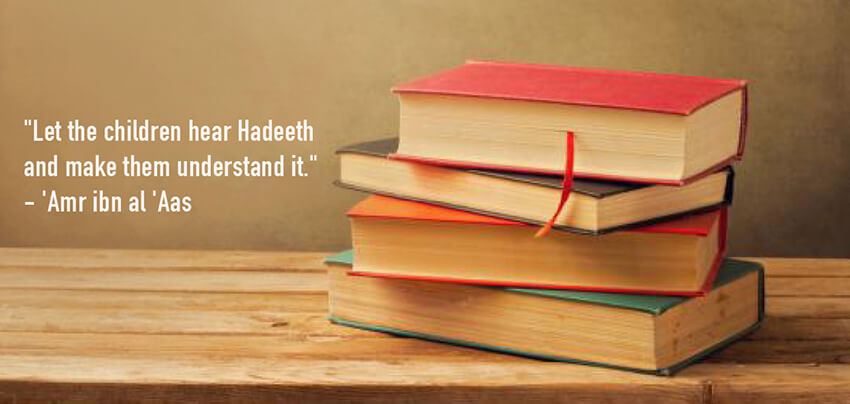Teaching some or all of the Qur’an to children is a common and blessed tradition in Muslim families. We know the importance of Qur’an and the merits of memorizing the Book of Allah. Teaching Qur’an to kids almost comes to us naturally. However, we tend to overlook the fact that revelations were given to the Prophet Muhammad (saws) through not only Qur’an but also through Prophetic traditions (Sunnah). Thus, the Sunnah of our Prophet (saws) is the secondary source of Islamic knowledge. Believing in revelations is the fourth basic principle of faith (Iman). The importance of Sunnah can be understood from the verse (ayah) below from the Qur’an:
”But no, by your Lord, they can have no Faith, until they make you [Muhammad] judge in all disputes between them, and find in themselves no resistance against your decisions, and accept (them) with full submission.” [al-Nisaa’ 4:65]
Therefore, Allah has made obedience to His Prophet a religious duty. And how it cannot be when the Islamic laws were also revealed to the Prophet (saws) in the form his Sunnah.
It is narrated by al-’Irbaad ibn Saariyah, may Allaah be pleased with him, that “the Messenger of Allaah (peace be upon him) led us in prayer one day, then he turned to us and exhorted us strongly . . . (he said), ‘Pay attention to my sunnah (way) and the way of the Rightly-guided Khaleefahs after me, adhere to it and hold fast to it.’” (Saheeh Abi Dawud, Kitaab al-Sunnah)
Learning and teaching the narrations of the Prophet (saws) was the way of our pious predecessors (Salaf). They considered it to be so important that they even encouraged it to their children. However, today many parents have abandoned teaching the books of hadith to their children. We are raising a generation of the followers of the Prophet Muhammad (saws) however we have not even given them the opportunity to study his (saws) blessed sayings or traditions yet. It is not to say that we are not teaching any Sunnah to our children but we are not taking them to the source of the tradition. For example, how many times do we tell our children to eat with their right hands but never tell them where this instruction comes from? When we will narrate to our children the instruction of the Prophet (saws) given to ‘Umar ibn Abi Salamah to eat with his right hand when he was eating in his blessed presence which is mentioned in a saheeh hadith that’s when we will do the right work. That’s letting our children know that the Prophet Muhammad (saws) was our legislator. That’s how we bring our beloved Prophet (Saws) into our and our children’s lives everyday. Simple statements such as, “That’s how the Prophet (saws) did it”, “The Prophet (saws) did not allow that”, “The Prophet (saws) told us to or taught us to…” and “Let’s read some of the teachings of the Prophet (saws) from the book” are some great little steps towards establishing Sunnah in your home. One of the best books to start learning and implementing the Sunnah in your everyday life is to read together the ahadith and commentary from “Al-Adab al-Mufrad” as a family. One hadith a day or even one hadith a week will grant good foundation for your children. Teach them and help them memorize both the Arabic version (if you are able to) and their meanings in English as well.
Below are collections of some narrations of the Salaf taken from Sharaf Ashaab Al-Hadeeth regarding teaching children the hadiths of Prophet Muhammad (saws) for our understanding and inspiration.
- Muhammad ibn al Husayn ibn al Fadl al Qattaan narrated…that Miskeen ibn Bukayr stated: A man passed by al ‘Amash while he was teaching Hadeeth and said: ‘You are teaching these children?!’ Al ‘Amash responded: ‘These children are preserving your religion for you!’
- Al Hasan ibn Abee Taalib informed me that…I heard al Musayyib ibn Waadi’ saying: ‘Ibn Mubaarak may Allaah have mercy upon him, if he saw the children of the people of Hadeeth with pens in their hands he would draw them close and say: ‘These are the seedlings of the religion, we were told that the Messenger of Allaah – صلى الله عليه وسلم – said: ‘Allaah continues to plant seedlings in this religion that He supports it with, they are youngsters amongst you today, but they may be the Kibaar [major scholars or elders] after you.’
- Muhammad ibn Ahmad ibn Rizq informed us that…’Abdullaah ibn ‘Ubayd ibn ‘Umayr said: ‘Amr ibn al ‘Aas stood at a circle of knowledge amongst Quraysh and said: ‘Why have you discarded these children? Do not do so, make space for them in the circle, let them hear Hadeeth and make them understand it. Indeed they are the youngsters amongst you now, and they will soon be the Kibaar of others. You were once the youngsters of a people, and today you are the Kibaar of your people.’
- Muhammad ibn al Faraj ibn ‘Alee al Bazaar narrated to us that…Zayd ibn ibn Ahkzam said: ‘I heard ‘Abdullaah ibn Dawood saying: ‘It is befitting for a man to force his children to listen to Hadeeth.’ He also used to say: ‘Religion is not by talk, indeed religion is only the Athaar [narrations] .‘
- Muhammad ibn Ahmad ibn Rizq informed us that…an Nadar ibn al Haarith said: I heard Ibraheem ibn Adham saying: ‘My father said to me: ‘My son, study Hadeeth, for every time you hear and memorize a Hadeeth I will give you a Dirham.’ So I studied Hadeeth upon that.’
May Allah make our children sincere learners and followers of the Prophetic traditions of Muhammad صلى الله عليه وسلم. May Allah’s peace and blessings be upon him, his family, his companions and all those who follow him until the Last Day.

